Putin, isolated and distrustful, leans on handful of hard-line advisers
Putin has built a power structure designed to deliver information he wants to hear, feeding into his miscalculations over Ukraine.
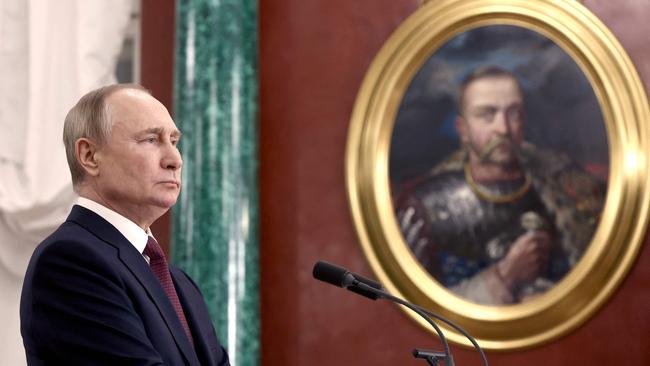
Russian troops were losing the battle for Lyman, a small city in eastern Ukraine, in late September when a call came in for the commanding officer on the front line, over an encrypted line from Moscow.
It was Vladimir Putin, ordering them not to retreat.
The president seemed to have limited understanding of the reality of the situation, according to current and former US and European officials and a former senior Russian intelligence officer briefed on the exchange. His poorly equipped frontline troops were being encircled by a Ukrainian advance backed by artillery provided by the West. Mr Putin rebuffed his own generals’ commands and told the troops to hold firm, they said.
The Ukrainian ambushes continued, and on Oct. 1, Russian soldiers hastily withdrew, leaving behind dozens of dead bodies and supplies of artillery to restock Ukraine’s weapons caches.
Mr Putin expected the war in Ukraine to be swift, popular and triumphant. For months, he struggled to come to terms with what instead became a costly quagmire, and found himself isolated and distrustful at the pinnacle of a power structure designed to reinforce his belligerent worldview and shelter him from discouraging news.
Through the summer, delegations of military experts and arms manufacturers emerged from presidential meetings questioning whether Mr Putin understood the reality on the battleground, according to people familiar with the situation. And while Mr Putin has since then gone to lengths to get a clearer picture of the war, they say, the president remains surrounded by an administration that caters to his conviction that Russia will succeed, despite the mounting human and economic sacrifices.
“The people around Putin protect themselves,” said Ekaterina Vinokurova, a member of his hand-picked human-rights council until Mr Putin removed her in November. “They have this deep belief that they shouldn’t upset the president.”
The resulting mistakes have shaped Russia’s disastrous invasion of Ukraine — from the initial days, when Mr Putin thought his soldiers would be met with flowers, to recent humiliating withdrawals in the northeast and south. Over time, Mr Putin, who has never served in the military, has become so wary of his own command structure that he has issued orders directly to the front line.
This article is based on months of interviews with current and former Russian officials and people close to the Kremlin who broadly described an isolated leader who was unable, or unwilling, to believe that Ukraine would successfully resist. The president, these people said, spent 22 years constructing a system to flatter him by withholding or sugar-coating discouraging data points.
US officials said they have struggled to find a Kremlin insider who both has influence over Mr Putin and also isn’t wrapped up in his narrative of Russian grievance. The president increasingly speaks of Russia in near-religious terms, as a 1,000-year-old civilisation waging a holy struggle that will right historical wrongs and elevate him into a pantheon of conquering czarist leaders such as Peter the Great.
Though contact between the US and Russia occurs almost every day, whether through their embassies, the Pentagon or the CIA, those conversations have become constrained, said US officials, who have found some of Mr Putin’s closest allies to be even more hard-line than the authoritarian leader himself.
Mr Putin wakes daily around 7am to a written briefing on the war, with information carefully calibrated to emphasise successes and play down setbacks, according to the former Russian intelligence officer and current and former Russian officials.
He has long refused to use the internet for fear of digital surveillance, Russian and US officials have said, making him more dependent on briefing documents compiled by ideologically aligned advisers.
Battlefield updates can take several days to reach Mr Putin’s desk, leaving them often out of date, people familiar with the matter said. Frontline commanders report to the Federal Security Service, or FSB, the successor to the KGB, which edits reports for experts at the Security Council, who pass them to Council Secretary Nikolai Patrushev, the arch hawk who helped persuade Mr Putin to invade Ukraine. He, in turn, passes the reports to Mr Putin.
Mr Patrushev and the Security Council didn’t respond to requests for comment. Kremlin spokesman Dmitry Peskov said planning around what Mr Putin refers to as a special military operation is classified as a state secret.
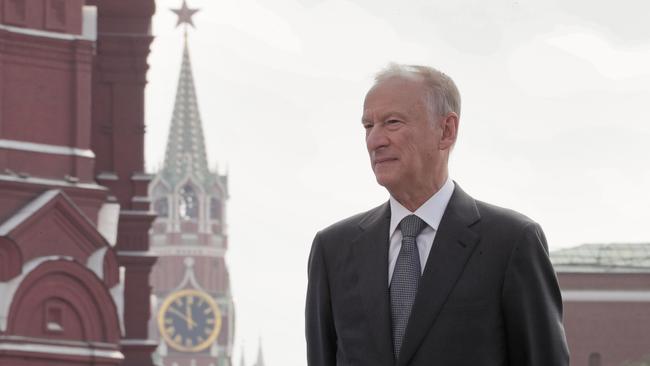
“The president, as earlier, has multiple channels for receiving information,” Mr Peskov said. “Any claims that he receives distorted information do not correspond to reality.”
Mr Putin, current and former Russian officials and people close to the Kremlin say, remains fully committed to bringing Ukraine to heel and is ready to mobilise Russia’s economy and population for years to succeed. If Western arms shipments and economic support flag, and Ukrainian morale dips, he could still emerge, on balance, as the victor in what is already the largest war in Europe since World War II.
For months, a trickle of Russian officials, pro-government journalists and analysts tried to bring word in person to their president about how his invasion was floundering, according to people familiar with the matter.
When one longtime pollster reached out to Mr Putin’s office about a survey showing lower-than-expected public support soon after the invasion, his office responded, using Mr Putin’s first name and his patronymic middle name, “Vladimir Vladimirovich doesn’t need to be upset right now,” according to a person familiar with the exchange.
In July, as American-supplied, satellite-guided Himars rockets began to strike Russian army logistics depots, Mr Putin summoned about 30 business leaders from defence companies to his Novo-Ogaryovo residence outside Moscow, according to people familiar with the meeting.
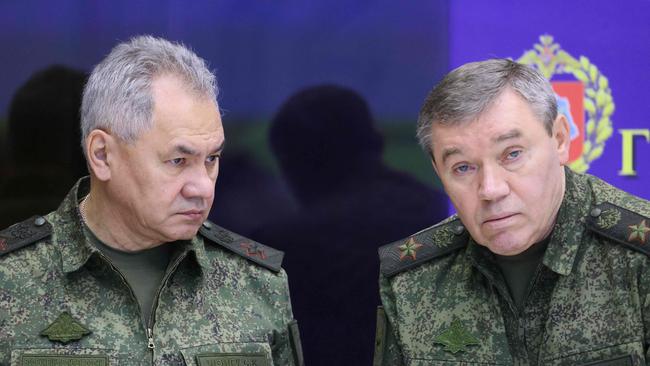
After three days of quarantine and three PCR tests, the executives sat at the end of a long wooden table, listening as Mr Putin described a war effort he considered a success. Ukrainians were only motivated to fight, he told them, because their army was shooting deserters, according to the people.
Then Mr Putin turned to Chief of General Staff for the Russian Armed Forces Valery Gerasimov, who said Russian weapons were successfully hitting their targets and the invasion was going according to plan. The arms makers left the meeting with a sense that Mr Putin lacked a clear picture of the conflict, the people said.
The defence ministry didn’t respond to requests for comment.
In September, a coterie of Russian military journalists and bloggers — all stalwart backers of the war — met with the president for more than two hours and came away with the same impression, according to people familiar with the matter.
That month, Mr Putin met Chinese leader Xi Jinping in Uzbekistan, and speaking softly, assured him Russia had the war under control, people familiar with the meeting said. Russian troops abandoned hundreds of square miles of territory that same week.
Ahead of a televised meeting with Mr Putin’s human-rights council this month, Adviser to the President and Council Chairman Valery Fadeyev and other members of the council encouraged the group not to broach topics such as Russia’s use of mercenary forces to bolster its troops, according to Ms. Vinokurova and another former council member who was removed three weeks before the meeting.
“We were told that our task was only to speak with the president about big issues, not about small topics or private matters,” said Ms. Vinokurova.
Mr Fadeyev confirmed that the council together had decided not to raise the subject of the mercenary forces but said there was no ban on the topic. He said questions are discussed beforehand with the presidential administration, but said that the idea that state bodies filter information for the president was “complete nonsense.”
To receive what he believes is raw information from the front, Mr Putin has recruited four of the most popular pro-war voices on Russian social media, a mix of state TV journalists, war correspondents and pro-Kremlin propagandists who have been embedding with the army, according to people familiar with the matter. The influencers are tasked with helping a new Kremlin-run working group produce a monthly report on the progress of Russia’s troop mobilisation, according to a presidential decree published on the Kremlin’s website this month.
Since March, when Mr Putin’s invasion began to clearly falter, Western leaders have been puzzled by how a leader so singularly occupied with the status of Ukraine and the restoration of Russia’s military greatness managed to so badly underrate Ukraine’s strength and misread his own.
Some of Mr Putin’s allies concede that information reaching the president was flawed and attribute military failures to poor planning by government officials. Konstantin Zatulin, a senior lawmaker from the ruling United Russia party who supports the war, said in an interview that the president “proceeded from an incomplete understanding of the situation and in some ways not fully correct.”
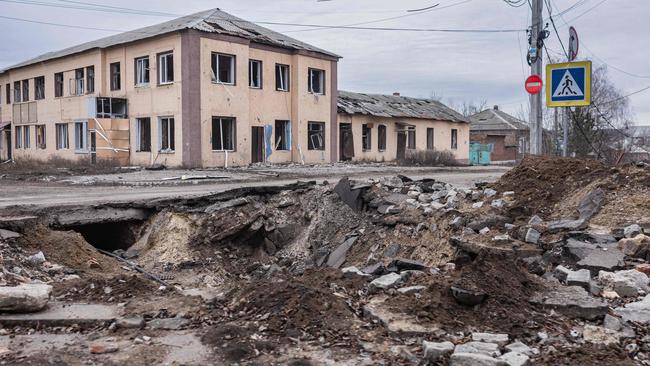
The war planners, he said, “clearly underestimated the strength of the enemy and over-estimated their own.”
Mr Putin needed only days to roll through more than a fifth of Georgia in 2008, and weeks to take Ukraine’s peninsula of Crimea in 2014 — an operation that his defence minister, Sergei Shoigu, and Mr Gerasimov, along with Russia’s SVR foreign intelligence agency and others, had advised against.
The SVR declined to comment.
The Russian president came to see the Crimea operation as a personal triumph. His inner circle gradually shrank down to his most hawkish advisers, who assured Mr Putin Russian forces would seize Kyiv within days.
“He probably forgot that when he was a KGB operative he was lying to his boss,” said Indrek Kannik, a former head of analysis for Estonian foreign intelligence.
Propaganda machine
The system of self-deception was decades in the making, said Boris Bondarev, a career diplomat who resigned from his longtime post at Russia’s permanent mission to the United Nations in Geneva after the invasion.
Diplomats at the mission learned during Mr Putin’s two-decade rule to feed Moscow the story it wanted to hear, he said.
Junior officials and senior directors knew that to win plaudits and promotions they should exaggerate good news and play down the bad, for fear of upsetting “papa,” a nickname for Mr Putin, once used for Russian tsars.
Mr Bondarev, a counsellor on arms control at the mission, could see that sanctions the West imposed on Russia in 2014 were having a much more serious impact than the country’s leadership understood. Russia’s drone production depended on European and American components. Aerospace engineering sourced items as basic as nylon from the West.
When Mr Bondarev raised it with colleagues who might have sounded the alarm about the potential effect on Russia’s military preparedness, he recalled, he was shot down. “They said: No, there will be no consequences,’ ” he recalled. “Then consequences came.”
Russia’s foreign ministry didn’t respond to requests for comment. “It seems that people will say just about anything nowadays to get public attention,” a spokesman for the Russian mission in Geneva wrote in an email. He declined to comment further.
Diplomats filed updates to Moscow in cables typed in 14-point font, each line 1.5 spaces from the next. Good news would usually dominate the first page of each cable, with reluctant concessions to setbacks relegated to the few that followed.
“You drown these unpleasant truths in a sea of many, many compliments,” said Mr Bondarev.
Updates relayed to the president were edited again by the Kremlin office, Mr Bondarev added: “For him, it becomes much harder to distinguish what is correct and what isn’t.”
Overconfidence
The seeds of Mr Putin’s overconfidence against Kyiv were planted in 2014, when his most senior war planners advised him not to seize Crimea.
Pro-Western protesters had overwhelmed riot police in central Kyiv, prompting Moscow-friendly Ukrainian President Vyktor Yanukovich to flee. Mr Putin summoned his security chiefs to the Kremlin for an all-night operation to exfiltrate Mr Yanukovich to Russia.
Shortly before sunrise, Mr Putin told his staff he had resolved to take Crimea, the predominantly Russian-speaking peninsula, he said in a 2015 documentary.
An invasion would backfire, the defence minister and advisers warned Mr Putin. But the president, convinced Russia’s Western enemies were seeking to yank Ukraine from Russia’s orbit, rejected their advice, according to the people familiar with the matter.
After a swift and nearly bloodless victory, his poll ratings soared above 80%. The Kremlin contrasted the weeks-long operation to czarist Russia’s painful defeat in the 19th century’s years-long Crimean War.
In Ukraine, the conflict eroded sympathy for Moscow and helped the country forge a common national identity. Kyiv revamped and expanded its military, jettisoning the last vestiges of Soviet doctrine to emulate NATO-style command systems.
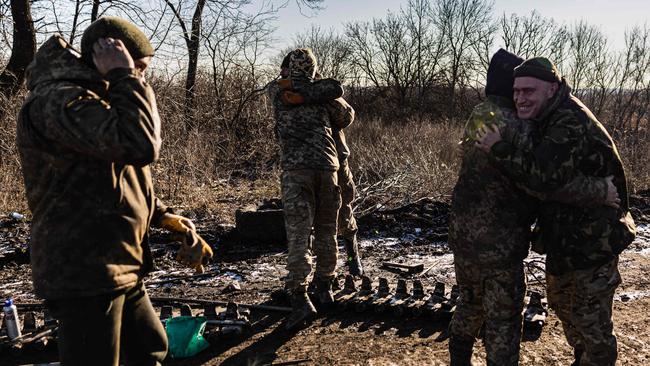
Mr Putin appears to have missed the shift.
In 2018, Mr Putin, who began to speak of Russia as a military power equal to the US, gave his annual state of the union speech in front of a screen showing nuclear weapons striking what appeared to be Florida. “Nobody listened to Russia,” he said. “Well, listen up now.”
Inside the Kremlin, more of the polling reaching Mr Putin was being conducted by the secret service itself, or FSO, edging out Kremlin-controlled but nominally independent polling outlets VTsIOM and FOM, whose work has its own flaws, according to people familiar with the matter. The FSO polls bypass Mr Putin’s administration and land right on his desk, the people said.
Mr Putin was becoming more reclusive and consulted a shrinking roster of old allies. When Sergei Kirienko, Kremlin domestic politics chief, gathered the full presidential team together in 2019, Mr Putin lectured them for hours on Russian sovereignty and his views. “They left feeling like he was talking to himself,” said a Kremlin political consultant who spoke with several of the administration officials in the room.
‘Small circle’
When Covid arrived in 2020, the health-conscious Mr Putin retreated from his usual residence in the Moscow suburbs to a remote estate near Lake Valdai, 250 miles from the capital, and the presidential summer residence in Sochi on the Black Sea.
There, he spent extended time with his old friend and media mogul Yuri Kovalchuk, who quarantined nearby, and the pair theorised over a shared idea of a restored Great Russia, according to people with knowledge of the relationship.
Other officials, including Mr Peskov, the spokesman, mostly spoke to Mr Putin through video screens, according to people familiar with the matter. Mr Peskov declined to comment on the assertion.
In a speech in April, CIA chief Bill Burns said that Mr Putin’s “circle of advisers narrowed and in that small circle it has never been career-enhancing to question his judgment or his almost mystical belief that his destiny is to restore Russia’s influence.”
Principal among them was the Security Council secretary, Mr Patrushev, who had worked with Mr Putin since the men were young KGB officers in Leningrad. The US, Mr Patrushev has said, “would prefer that Russia did not exist at all.”
As the circle tightened, Mr Putin became increasingly paranoid, convinced that the US was stationing nuclear weapons in Ukraine, US officials familiar with the matter said. Messrs. Gerasimov and Shoigu, who retained access to Mr Putin, lacked influence to moderate his views, the officials said.
In July 2021, Mr Putin published a 6,917-word historical essay on the Ukrainian nation, penned in isolation with Mr Kovalchuk by his side.
From inside Ukraine, a Kremlin-connected businessman was telling Mr Putin what he wanted to hear. Viktor Medvedchuk, a Russia-funded politician, had made Mr Putin godfather to his daughter Darya. For years, Mr Medvedchuk had a dedicated line to reach the president — a phone with a Russian number and a secure calling app the Ukrainians called Kremlyovka, in reference to the Kremlin, according to Yuriy Lutsenko, the former head of the Ukrainian prosecutor’s office, which had tapped the phones of people linked to the Kremlin in an investigation into the 2014 downing of a Malaysian airplane above Ukraine.
Mr Medvedchuk assured Mr Putin that Ukrainians saw themselves as Russian, and would welcome the invading soldiers with flowers, said two people close to the Kremlin.
Mr Medvedchuk, who had been arrested in Ukraine and then released to Russia as part of a prisoner swap in September, couldn’t be reached for comment.
Meanwhile, the FSB was tweaking polling data to convince Mr Putin that Ukrainians would welcome Russian soldiers, according to Ukrainian Security Council Secretary Oleksiy Danilov and a person close to the Kremlin. Other opinion surveys appeared to be entirely fabricated, said Mr Danilov.
The FSB didn’t respond to requests for comment.
War planning fell to the FSB more than the military, according to the former Russian intelligence officer and a person close to the defence ministry. The ministry kept normal working hours in the weeks leading up to the invasion, with little sense of the urgency.
Mr Putin’s spokesman, Mr Peskov; his foreign minister, Sergei Lavrov; chief of staff, Anton Vaino; and Mr Kirienko, the domestic policy chief, weren’t aware of the plans, according to people familiar with the matter.
Fifteen days into the war, after his quick strike on Kyiv failed, Mr Putin scowled in a gold-embroidered armchair as his defence minister briefed him over a video link in a televised meeting.
“Vladimir Vladimirovich, everything is going to plan,” said Mr Shoigu. “We report this to you every day.”
WSJ
— Alan Cullison, Vivian Salama and Keith Zhai contributed to this article.

To join the conversation, please log in. Don't have an account? Register
Join the conversation, you are commenting as Logout